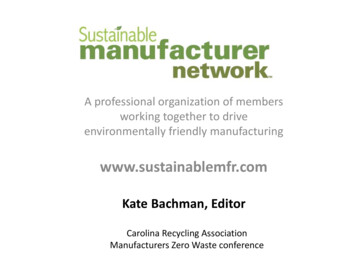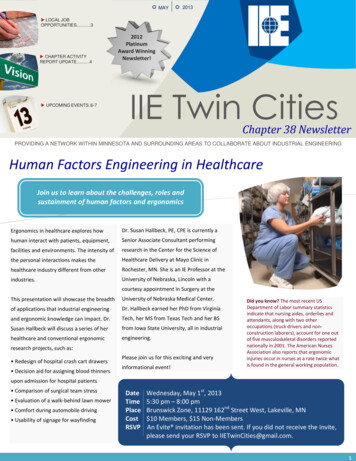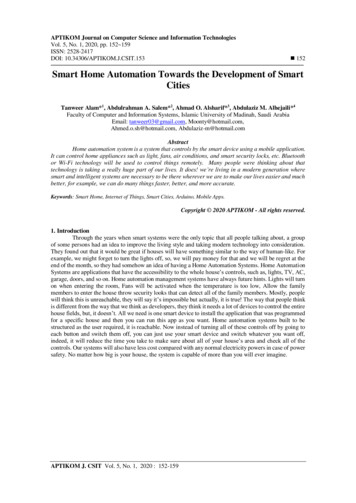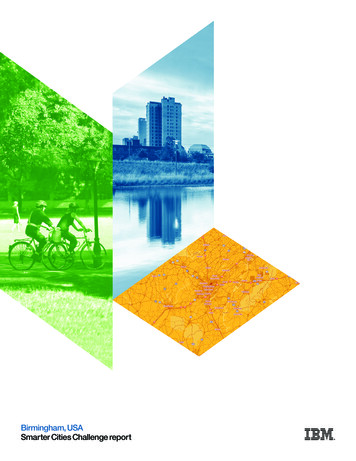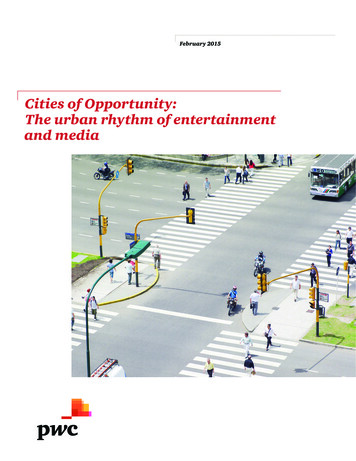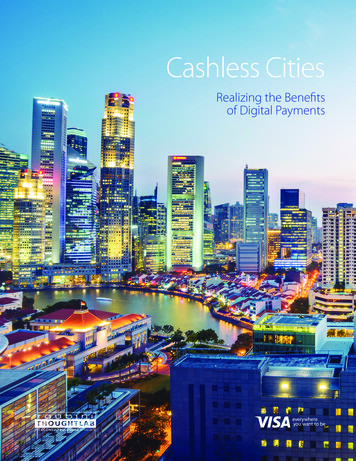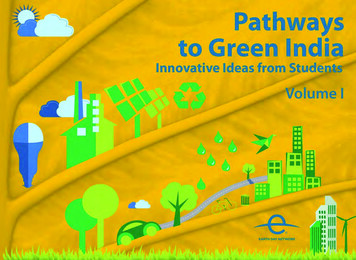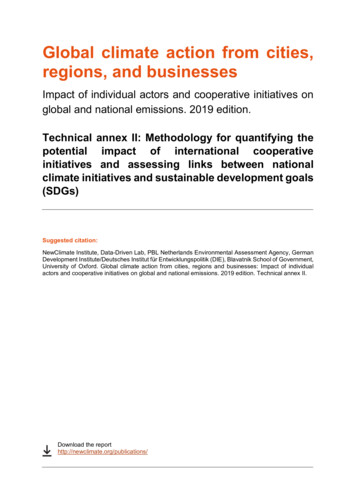
Transcription
CITIZENSAT THE CENTERSeoul’s Journey to Zero WasteZERO WASTE CITIES ASIA SERIESSeoul, South Korea
CITIZENS AT THE CENTER‘Waste, Animals and Poetry Project’ called for plastic-free summer in Sangam-Dong, Seoul KOREANCULTURE AND INFORMATION SERVICESeoul’s Journey to Zero WasteTwo big challengespushed Seoul,South Korea to takethe issue of wastemanagement seriously. It isdensely populated, with over10 million people generating9,000 tons of municipal solidwaste each day. As with anycities that experienced rapidurbanization, Seoul MetropolitanCity has struggled with growingand almost uncontrollablewaste problems. Limited landspace also posed an additionalchallenge to the city, as landfillcapacity is generally low, andsiting of landfills often facesfierce objection from localresidents. Therefore, wastereduction and waste diversionfrom landfills have been the keypriorities for Seoul.2SEOUL’S JOURNEY TO ZERO WASTEThanks to progressive waste diversionpolicies, per capita municipal solidwaste generation has been decreasingin Seoul for the last three decades.Korea’s world-leading solid wastemanagement legislation and initiativesinclude a volume-based waste disposalfees system, a deposit refund system,extended producer responsibility (EPR),and bans on problematic plastic itemsand packaging, which all significantlycontributed to the waste reductionsince the early 1990s.CITIZENS SHAPINGWASTE MANAGEMENTPOLICY TOGETHERGiven the limited land space,the overall interest and citizenparticipation in waste issues is high inKorea. The country’s environmentalpolicies regarding waste have beenimproving with vigorous voices andactions of environmental groupsfrom early 1990s, the period inwhich the government began todevelop an overall framework ofwaste management.Volume-rated WasteDisposal SystemIn 1995, the Korean Governmentimplemented a ‘volume-basedwaste disposal system,’ under whichresidents are charged based on theamount of discharged waste, in orderto reduce waste and promote recyclingbased on three principles of ‘polluterpays’, ‘precautionary measures first’,and ‘resources recycling.’1Five kinds of waste bags are used inthis system, which categorize wasteinto domestic waste, food waste,business waste, public purposes, andconstruction debris. Residents paydifferent fees for the bags dependingon the size and the regions in whichthey reside, while enjoying a freeservice for collection of recyclables.
SEOULSEOULPopulation: 10,054,979 (Q1 2019)Land area: 605.21 km2Population Density: 16,095.86/km2Waste Generation: 0.88 kg/personRecycling rate: 60% (2016)The law requires that residents properlysort out their waste and imposes finesof up to approximately 1,000 forviolations of the garbage disposal rules.Later in 2010, the government alsoallowed major grocery store chains toreplace single-use grocery bags withmulti-purpose plastic bags that can beused as litter bags in the area, in orderto reduce the number of plastic bagsdiscarded after grocery shopping.A joint evaluation group of thegovernment and environmental groupsworked together to shape the world’svery first nationwide volume-basedwaste fee system. Environmentalgroups intervened with the rule-makingprocess through this channel, puttinga strong emphasis on the importanceof waste reduction at the sourceand sharing suggestions from theperspective of local waste managementsystems. Local governments, alongwith environmental groups, playedan important role in successfullyimplementing the volume-basedwaste fee system across the nation,by conducting feasibility studies andcoordinating public hearings.The impact of the volume-based wastefee system was immediately visible.Compared to 1994, Seoul’s recyclingrate increased from 21% to 29% in 1995,resulting in less reliance on landfillsor incinerators. The policy directlyincentivized citizens to take better careof household waste generation forsource separation and affected the wayproducts are designed and packagedas the public increasingly preferred lesswasteful options. The implementationof the volume-rated disposal systemalso contributed to job creationand technological improvement inthe recycling sector, which led toremarkable growth of the industry from1995 through 2005.Seoul also introduced a similar policyfor food waste in 2013.2 The regulationon food waste began to surface in1998, when environmental groups andresidents living near landfills urgedfor a ban on disposal of food waste inlandfills, raising concerns on healthimpacts of emissions, odors, and heavygarbage truck traffic. This promptedthe government to introduce a policyon food waste composting as well as alaw prohibiting food waste from directlandfilling starting from 2005.Currently in Seoul, all food wastedisposal is charged based on thevolume or weight, depending on themethod each municipality choosesamong 1) charging per standard foodwaste disposal bag, 2) selling stickerspermitting food waste disposal, and3) using radio-frequency identification(RFID) to track the weight ofthe food waste.In other provinces, municipalitiescollect food waste either free of chargeor using a quantity-based systemin its discretion. After introducingthis disposal rate system in 2013,which is also aligned with Seoul’shighly digitalized waste informationdatabases, the city achieved a 20 %reduction in food waste. From 2013to 2017, local groups including KoreaZero Waste Movement Network, heldexpert forums on the volume-basedfood disposal system to check theprogress and inform local governmentsof solutions for challenges in theimplementation of the system.RFID-based Pay-As-You-Throw Food Waste Collection system in Seodaemun-gu, Seoul THE FINANCIAL NEWSSEOUL’S JOURNEY TO ZERO WASTE3
Making SeoulPlastic-FreeAs plastic pollution emerges as aglobal issue with such devastatingenvironmental health impacts, Seoulhas developed a comprehensiveplan for plastic waste reductionin 2018, working closely with civilsociety groups. ‘Citizen Committeefor Green Seoul,’ the city’s ecogovernance platform for environmentalpolicymaking, has been facilitatingthe coordination among multi-stakeholders, engaging with more than 100environmental groups.Building on the central government’sgoal to halve plastic waste generationby 2030, which is supported by subgoals of reducing waste by 20% at themanufacturing phase, gradually banningsingle-use cups and straws, andachieving zero landfilling of domesticwaste, Seoul announced its own set ofgoals for plastic reduction by 2022.As part of Seoul’s plastic-free policyinitiatives, local environmental groupsare leading several campaigns to phaseout plastic products, including plasticcups and straws, plastic bags, fooddelivery containers, and plastic laundrycovers. The groups organize onlineand offline campaigns, and encouragebusiness participation throughconcluding a voluntary agreement,reaching out to various entities such ascoffee shops, restaurants, wholesalebusinesses, traditional markets, hotels,and movie theaters.Local campaigns for single-use plasticreduction have long been sproutingsystemic and cultural shifts from thelate 1990s. Environmental groupsproposed banning single-use cups,plates, chopsticks, toothpicks, plastictable covers in restaurants, disposableamenities in hotels, disposable seatsin sport venues, and free distributionof take-out cups in cafes and fast foodchains. Instead of providing disposableitems free of charge, a deposit schemewas applied, which requires a monetarydeposit on beverage containers.The nation’s first disposable-cups-freefast food restaurant opened in Seoul in2001, following a voluntary agreementbetween the franchise company(‘Lotteria’), the Ministry of Environment4SEOUL’S JOURNEY TO ZERO WASTEthrough KZWMN’s coordination. By2002, more than 400 major coffeeshops and fast-food chains concluded avoluntary agreement with the Ministryof Environment to reduce disposableproducts. These efforts contributedto the amendment of the Act on thePromotion of Saving and Recycling ofResources in 2003 which prohibitedfree distribution of plastic and the useof disposable cups in stores largerthan 150 sqm, and required mandatorycollection and recycling.Unfortunately, the bans on freedistribution of disposable productsfaced a major setback in 2008, as theresistance of food distribution industryand the manufacturers of disposablecups grew. Abolition of the depositsystem resulted in an increase inillegal dumping and overflowing ofpublic garbage bins, which also causedfinancial loss to local governments.Despite severe opposition from theindustry and challenging politicalenvironment, the groups continued
Citizens are staging a rally against disposable plastic productsand excessive plastic packaging as part of ‘Plastic Attack’campaign on Plastic Bag Free Day in front of Seoul Station, onJuly 3, 2018 KOREA ZERO WASTE MOVEMENT NETWORKto raise awareness and monitorbusiness practices.In 2011, Starbucks Korea respondedto such effort by committing tobanning disposable cups in 50 storesand gradually expanded the policy toall stores. Other coffee shop chainsjoined the movement later that year,replacing single-use cups with reusablemugs. The campaigns often frizzledout, however, as all initiatives wererelying on voluntary agreements in theabsence of a mandatory regulation.To one’s surprise, China’s ban onwaste importation which came intoeffect in 2018 turned out to be ablessing in disguise. The governmentrushed to devise policy measures tocalm the disruption caused by lack ofmarkets for low-grade plastic scrapand announced the above-mentionedset of goals and action plans to tacklethe plastic waste. Even though Koreawitnessed ups and downs with itsapproach to plastic pollution, voicesof local campaigns have persistentlyguided and formed policy shifts andsolutions that are centered around theurgency of reducing waste generationfrom the beginning.Fostering Zero WasteCommunities in SeoulNot only raising voices to urge forpolicy improvement required for ZeroWaste, civil society organizationsSEOUL’S JOURNEY TO ZERO WASTE5
Goals and Strategies of ‘Plastic Free Seoul’ announced inNovember, 2018. SEOUL METROPOLITAN CITY GOVERNMENTConnecting Citizens forResource Sharinghave also been striving to build ZeroWaste communities in Seoul, beingan active change maker for betterresource recovery practices. Groupshave been closely monitoring localrecycling systems, especially in publicbuildings, schools and residentialrecycling stations in Seoul, to surveythe level of user satisfaction andidentify remaining challenges. KZWMNconcluded an MOU with severaldistricts in Seoul to build a ZeroWaste (single-use-free) community byevaluating the existing infrastructureand organizing multi-stakeholdermeetings among government officials,residents, small business owners,and NGOs.In 2017, Seoul Government openedSeoul Upcycling Plaza3, an upcyclingcenter that aims to raise awareness onenvironmental, social, and economicadvantages of upcycling. All citizens,as well as upcycling educators andbusiness leaders are invitedto organize workshops,lectures,2003Extended producerresponsibilitysystem introduced1995Volume-basedwaste disposalsysytemlaunched1990Recycling binsdistributed toapartments6exhibitions, sales and other events toshare their knowledge and experiencesin advancing upcycling of resources.The center is an excellent space foreducation on resource recovery, asone can casually visit the museum ofupcycled products and art pieces madeof discarded materials, shop at a reusestore, take part in weekend flea markets,or enjoy food or beverage at a cafe.Another example of promotingcirculation of resources amongcommunity members is Seoul’sGreen Marketplace project.4 The cityestablished a system to support citizenled flea markets throughout the city,all year around, in 2010, in order toencourage resource reuse and sharing.In close partnership with Korea’s biggestnon-profit used goods store chain‘Beautiful Store,’ Seoul Governmentsupervises flea markets taking placein various scales and personalities,providing a space to buy and sell usedgoods, regional specialty productsand handcrafts, and enjoy traditionalfood and diverse culturalperformances. IntheseSEOUL’S JOURNEY TO ZERO WASTEBans on freedistribution ofdisposableproductsintroduced2005Direct landfillingprohibited forfood wasteG
markets, naturally, use of any singleuse items such as plastic bags and cupsis prohibited.THE WAY FORWARDSeoul City has been making a leapforward to become the forefront ofZero Waste, with its commitment tosending zero municipal solid waste tolandfills and achieving a recycling rategreater than 66% by 2030. On plasticpollution, the city plans to halve theamount of disposable plastic itemsused by 2022, while increasing therecycling rate to 70%. Progressive policyinitiatives have been jointly developedby environmental groups and localresidents, through transparent decisionmaking channels.Many environmental groups call formore holistic and ambitious approach,2010Green Marketplaceproject launchedhowever, as Seoul is among thetop 10 cities5 that generate mostwaste in the world, and Korea is thethird biggest country when it comes toper capita plastic consumption.6 Butwhat is especially concerning is thecity’s push for waste incineration in thename of ‘waste-to-energy’ or ‘energyrecovery from waste.’ Currently, thereare four MSW incinerators operating inSeoul, which burn nearly 3,000 tons ofwaste each day. Processing waste in anincinerator, even in the technologicallyadvanced facilities, results in toxicemissions and by-products such aswastewater and ash, posing significantenvironmental harm to the community.Far from ideal for a highly dense citylike Seoul, it has long been provokingcontroversy in many communities andfacing firm opposition from residentsliving near the facilities.2013Volume-basedfood wastedisposalsystemlaunched inSeoulWith a strong political will, wellestablished infrastructure andinstitution, Seoul has great potentialin achi
achieving zero landfilling of domestic waste, Seoul announced its own set of goals for plastic reduction by 2022. As part of Seoul’s plastic-free policy initiatives, local environmental groups are leading several campaigns to phase out plastic products, including plastic cups and straws, plastic bags, food delivery containers, and plastic laundry
